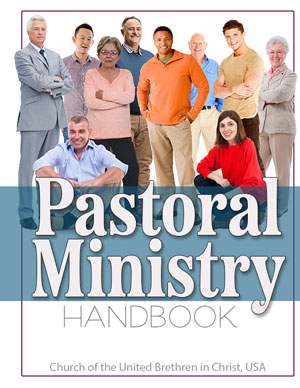PASTORAL MINISTRY HANDBOOK | CHAPTER 20
Ten Principles to Assist and Encourage Your Pastor’s Spouse
Typically, the pastor is the only individual in the family employed by the church. It is imperative for the church leadership and church family to see the pastor’s spouse as such—the spouse of their pastor. Even in the rare situation where the spouse (or adult children) is employed by the church, this distinction is key to authority and relational issues.
To encourage a healthy atmosphere between the pastor, pastor’s spouse, and church body, several areas need to be considered and addressed throughout the ebbs and flows of family life and ministry life.
¶341 Ministry
Understand that God has given pastoral spouses talents and spiritual gifts to be used for his glory—within the home, church, and/or community. Make every effort to provide a welcoming environment for their gifts to be used within the church body.
¶342 Distinction
Be cautious in assuming or placing unwelcome responsibilities on pastoral spouses simply because they are married to the pastor. Give them freedom to help their partners carry the burden of ministry as best suits the pastoral couple.
¶343 Individuality
Just as each pastor’s ministry will have its own distinctives and characteristics, so too will the ministry of the pastor’s spouse. Seek to encouage pastoral spouses with the unique personality, giftedness, and strengths God has given them—and in relation to their stage in life and the demands they currently face (children, aging parents, etc.).
¶344 Sanctuary
It is very valuable to promote and encourage a “safe haven” within the pastor’s home. For churches that provide a parsonage for their pastor, it is important to also grant the necessary freedom to the pastor’s family to make their house their home. The church family and key leadership should respect the privacy of those who live in the parsonage and provide resources for any needed repairs or improvements. These respect issues are equally important for churches whose pastor lives in a private dwelling.
¶345 Connection
It is important for church leaders to promote and encourage healthy communication. Pastor, pastor’s spouse, and church family all need to avoid triangulation while also allowing for personal styles and family dynamics when dealing with ministry-related communication (email, texting, voicemail, etc.).
¶346 Friendship
Promote and encourage healthy interactions between pastoral spouses and the church family and community. Relationships are a natural avenue for sharing life, faith, and ministry. Opportunities to nurture relationships with extended family, pastoral couples, church family, and community are essential for long-term health and contentment.
¶347 Parenthood
Pastoral spouses play a vital role in raising their children. Support and encourage a healthy environment within the family unit by providing the freedom for the unique needs and stages of each child as they grow and mature. Be careful not to single out the pastor’s children on issues of behavior and ministry involvement. Rather, pray for and encourage the pastor’s children as individuals and embrace their unique personal and spiritual development.
¶348 Sacrifice
Understand that pastoral spouses and children often forfeit/share out of their personal time with the pastor to benefit the needs of others. Promote a healthy schedule for pastors to take days off and vacation days each year for personal health and mental well-being, as well as for the refreshment and nurturing of family relationships.
¶349 Commitment
All married couples who profess a faith in Jesus Christ will, therefore, serve as an example of what a Christian home and marriage should look like. While there is no perfect pastor or pastor’s spouse, the reality is that their relationship and marriage may be used by others in unfair comparison, be idealized, or be targetted with unwanted attention.
Church leadership must commit to pray for their pastor’s home life, marriage relationship, and children. Understand that Satan targets Christian marriages for attack—including the pastoral couple. Encourage them to share ministry together as much as possible within their specific family dynamics, preferences, and availability. Prayer support by the church family on behalf of the pastoral spouses and families is essential for the pastor’s health—and the health of the church.
¶350 Invest
A pastor who is happy at home will be a more effective pastor for the church body as a whole. Open dialogue between pastors and the Personnel Relations Committee concerning the well-being and happiness of the spouse is beneficial for both pastors and spouses. Encourage continued health within pastoral homes and marriages by providing the necessary funds to underwrite the expense for an annual get-away with the spouses and/or the necessary resources to attend a marriage conference together. Hosting a Pastor Appreciation (and family) Day periodically is another way to invest in your pastor’s family and to promote your loving support.




